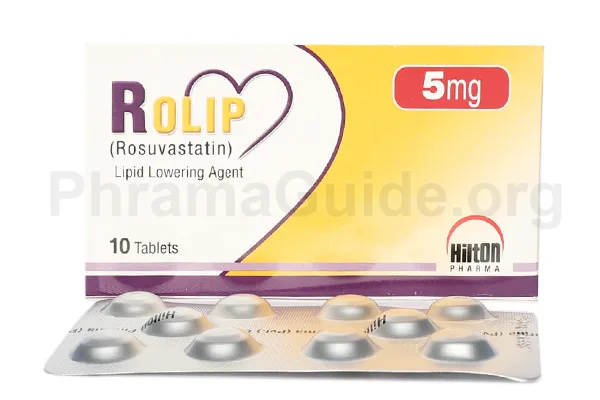Rolip tablet is a medication classified as a statin, which is primarily used for the treatment of high cholesterol and the prevention of cardiovascular disease, including:
- Hyperlipidemia (High Cholesterol): Rolip tablet is commonly used to lower elevated levels of low-density lipoprotein cholesterol (LDL-C), often referred to as “bad” cholesterol. It is also effective in reducing total cholesterol, triglycerides, and apolipoprotein B levels. By inhibiting the enzyme HMG-CoA reductase, Rolip helps decrease the production of cholesterol in the liver, leading to reduced cholesterol levels in the bloodstream.
- Dyslipidemia: Rolip tablet is used to treat dyslipidemia, a condition characterized by abnormal lipid levels in the blood. It can help normalize lipid profiles by lowering LDL-C and triglycerides and increasing high-density lipoprotein cholesterol (HDL-C), often referred to as “good” cholesterol.
- Prevention of Cardiovascular Events: Rolip tablet is used as a preventive measure against cardiovascular events in individuals at high risk. This includes individuals with a history of cardiovascular disease, diabetes, or other risk factors. By lowering LDL-C levels, Rolip helps reduce the risk of heart attacks, strokes, and other cardiovascular events.
- Familial Hypercholesterolemia: Rolip tablet is also used in the treatment of familial hypercholesterolemia, an inherited disorder characterized by very high levels of LDL-C. It is effective in reducing LDL-C in these individuals, helping to manage their cholesterol levels.
Off-label Uses of Rolip Tablet
- Non-Alcoholic Fatty Liver Disease (NAFLD): Rolip tablets may be used off-label in the treatment of non-alcoholic fatty liver disease, a condition characterized by the accumulation of fat in the liver. Rolip may have beneficial effects on liver enzymes and liver fat content in individuals with NAFLD, although further research is needed to establish its efficacy and safety for this indication.

What is Rolip?
Rolip is one of the leading brands of Rosuvastatin, manufactured and marketed by Hilton Pharmaceuticals (Pvt) Ltd, Pakistan.
Rolip Alternatives : Other Similar Brands
The following are some available alternative brands of Rolip and their manufacturers.
- Rovista : Getz Pharmaceuticals (Pvt) Ltd, Pakistan.
- Rosubar : Barrett Hodgson Pakistan (Pvt) Ltd.
- Rosera : Sami Pharmaceuticals (Pvt) Ltd, Pakistan.
- Rostor : Saffron Pharmaceuticals (Pvt) Ltd, Pakistan.
- Ruvastat : Abbott Laboratories (Pakistan) Ltd.
- Rosulin : Highnoon Laboratories Pakistan (Pvt) Ltd.
- Crestat : (CCL) Consolidated Chemical Laboratories (Pvt) Ltd, Pakistan.
- Fourtius : High-Q Pharmaceuticals (Pvt) Ltd, Pakistan.
- Kestor : Scilife Pharmaceuticals (Pvt) Ltd, Pakistan.
- Rosuvax : Asian Continental Pharma (Pvt) Ltd, Pakistan.
- Rast : Tabros Pharma, Pakistan.
Rolip : Available Formulations and Strengths
Presently, Rolip is available in Tablet Form with the following strengths.
Rolip Tablets : 5mg, 10mg, and 20mg strengths.
Who Should Not Use Rolip?
Rolip has several contraindications, which are specific situations or conditions where the use of Rolip is not recommended due to the potential risks outweighing the potential benefits.
- Hypersensitivity: Rolip is contraindicated in individuals who have a known hypersensitivity or allergy to Rolip or any of its components. Signs of hypersensitivity may include rash, itching, swelling, severe dizziness, or difficulty breathing.
- Active Liver Disease: Rolip is contraindicated in individuals with active liver disease or unexplained persistent elevations of liver function tests (LFTs) greater than three times the upper limit of normal (ULN). It is important to assess liver function prior to starting Rolip and monitor liver enzymes during treatment.
- Pregnancy and Breastfeeding: Rolip is contraindicated in pregnant and breastfeeding women. It can potentially cause harm to the developing fetus or newborn. Women who are pregnant, planning to become pregnant, or breastfeeding should not use Rolip.
- Concomitant Use of Certain Medications: Rolip should not be used in combination with certain medications due to potential drug interactions or increased risk of adverse effects. Examples include cyclosporine, gemfibrozil, and certain HIV protease inhibitors. It’s important to inform healthcare professionals about all medications being taken to assess potential interactions.
- Severe Renal Impairment: Rolip should be used with caution in individuals with severe renal impairment (kidney dysfunction) as its elimination may be reduced. Dose adjustment may be necessary in individuals with severe renal impairment.
What is the Recommended Daily Dosage of Rolip?
Rolip Dose for High Cholesterol (hypercholesterolemia):
- One Tablet of 10mg once daily.
- The dosage can be adjusted based on individual response and the desired cholesterol levels.
- The maximum recommended dose is 40mg once daily.
Rolip Dose for the Prevention of Cardiovascular Events:
- One Tablet of 20mg once daily.
- The dosage may be adjusted based on individual risk factors and response to treatment.
How Rolip Works?
Rolip works by inhibiting an enzyme called HMG-CoA reductase. This enzyme plays a key role in the production of cholesterol in the liver. By inhibiting HMG-CoA reductase, rosuvastatin reduces the amount of cholesterol synthesized in the liver, leading to a decrease in the levels of low-density lipoprotein cholesterol (LDL-C), often referred to as “bad” cholesterol.

Leave A Comment